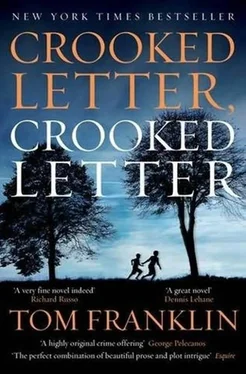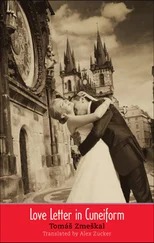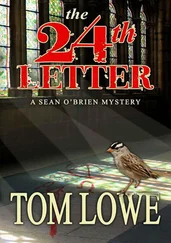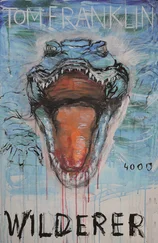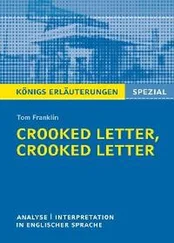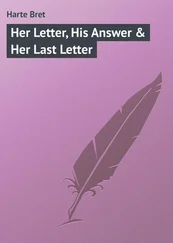
Tom Franklin
Crooked Letter, Crooked Letter
© 2010
For Jeff Franklin
and
in loving memory
of
Julie Fennelly Trudo
M, I, crooked letter, crooked letter, I, crooked letter, crooked letter, I, humpback, humpback, I.
– How southern children are taught to spell Mississippi
THE RUTHERFORD GIRL had been missing for eight days when Larry Ott returned home and found a monster waiting in his house.
It’d stormed the night before over much of the Southeast, flash floods on the news, trees snapped in half and pictures of trailer homes twisted apart. Larry, forty-one years old and single, lived alone in rural Mississippi in his parents’ house, which was now his house, though he couldn’t bring himself to think of it that way. He acted more like a curator, keeping the rooms clean, answering the mail and paying bills, turning on the television at the right times and smiling with the laugh tracks, eating his McDonald’s or Kentucky Fried Chicken to what the networks presented him and then sitting on his front porch as the day bled out of the trees across the field and night settled in, each different, each the same.
It was early September. That morning he’d stood on the porch, holding a cup of coffee, already sweating a little as he gazed out at the glistening front yard, his muddy driveway, the bobwire fence, the sodden green field beyond stabbed with thistle, goldenrod, blue salvia, and honeysuckle at the far edges, where the woods began. It was a mile to his nearest neighbor and another to the crossroads store, closed for years.
At the edge of the porch several ferns hung from the eave, his mother’s wind chime lodged in one like a flung puppet. He set his coffee on the rail and went to disentangle the chime’s slender pipes from the leaves.
Behind the house he rolled the barn doors open, a lawn mower wheel installed at the bottom of each. He removed the burnt sardine can from the tractor’s smokestack and hung the can on its nail on the wall and climbed on. In the metal seat he mashed the clutch with one foot and brake with the other and knocked the old Ford out of gear and turned the key. The tractor, like everything else, had been his father’s, a Model 8-N with its fenders and rounded hood painted gray but its engine and body fire-engine red. That red engine caught now and he revved it a few times as the air around his head blued with shreds of pleasant smoke. He backed out, raising the lift, bouncing in the seat as the tractor’s big wheels, each weighted with fifteen gallons of water, rolled over the land. The Ford parted the weeds and wildflowers and set off bumblebees and butterflies and soggy grasshoppers and dragonflies, which his mother used to call snake doctors. The tractor threw its long shadow toward the far fence and he turned and began to circle the field, the privet cut back along the bobwire, the trees tall and lush, the south end still shaded and dewy and cool. He bush-hogged twice a month from March to July, but when the fall wildflowers came he let them grow. Migrating hummingbirds passed through in September, hovering around the blue salvia, which they seemed to love, chasing one another away from the blooms.
At the chicken pen he shifted into reverse and backed up, lowering the trailer hitch. He checked the sky shaking his head. More clouds shouldering over the far trees and rain on the air. In the tack room he ladled feed and corn into a plastic milk jug with the mouth widened, the brown pellets and dusty yellow corn giving its faint earthy odor. He added a little grit, too, crushed pebble, which helped the chickens digest. The original pen, which his father had built as a Mother’s Day gift somewhere back in Larry’s memory, had run twenty feet out for the length of the left side of the barn and adjoined a room inside that had been converted to a roost. The new pen was different. Larry had always felt bad that the hens lived their lives in the same tiny patch, dirt in dry weather and mud in wet, especially when the field surrounding his house, almost five acres, did nothing but grow weeds and lure bugs, and what a shame the chickens couldn’t feast. He’d tried letting a couple run free, experiments, hoping they’d stay close and use the barn to roost, but the first hen made for the far woods and got under the fence and was never seen again. The next a quick victim of a bobcat. He’d pondered it and finally constructed a scheme. On a summer weekend he’d built a head-high moveable cage with an open floor and attached a set of lawn mower wheels to the back end. He dismantled his father’s fence and made his own to fit against the outside door to the coop, so that when the chickens came out they came out in his cage. Each morning he latched an interior door and, weather permitting, used the tractor to pull the cage into the field, onto a different square of grass, so the chickens got fresh food-insects, vegetation-and the droppings they left didn’t spoil the grass but fertilized it. The chickens sure liked it, and their egg yokes had become nearly twice as yellow as they’d been before, and twice as good.
He came outside with the feed. Storm clouds like a billowing mountain loomed over the northernmost trees, already the wind picking up, the chime singing from the porch. Better keep em in, he thought and went back in and turned the wooden latch and entered the coop, its odor of droppings and warm dust. He shut the door behind him, feathers settling around his shoes. Today four of the wary brown hens sat in their plywood boxes, deep in pine straw.
“Good morning, ladies,” he said and turned on the faucet over the old tire, cut down the center like a donut sliced in half, and as it filled with water he ducked through the door into the cage with the nonsetting hens following like something caught in his wake, the tractor idling outside the wire. He flung the feed out of the jug, watching for a moment as they pecked it up with their robotic jerks, clucking, scratching, bobbing their heads among the speckled droppings and wet feathers. He ducked back into the coop and shooed the setting hens off and collected the brown eggs, flecked with feces, and set them in a bucket. “Have a good day, ladies,” he said, on his way out, turning the spigot off, latching the door, hanging the jug on its nail. “We’ll try to go out tomorrow.”
Back inside the house he blew his nose and washed his hands and shaved at the bathroom mirror, the hall bathroom. He tapped the razor on the edge of the sink, the whiskers peppered around the drain more gray than black, and he knew if he stopped shaving his beard would be as gray as the beards his father used to grow during hunting seasons thirty, thirty-five years before. Larry had been chubby as a kid but now his face was lean, his brown hair short but choppy as he cut it himself, had been doing so even before his mother had gone into River Acres, a nursing home nowhere near a river and mostly full of blacks, both the attendants and attended. He’d have preferred somewhere better, but it was all he could afford. He splashed warm water on his cheeks and with a bath rag swiped his reflection into the steamy mirror.
There he was. A mechanic, but only in theory. He operated a two-bay shop on Highway 11 North, the crumbling white concrete block building with green trim. He drove his father’s red Ford pickup, an early 1970s model with a board bed liner, a truck over thirty years old with only 56,000 miles and its original six-cylinder and, except for a few windshields and headlights, most of its factory parts. It had running boards and a toolbox on the back with his wrenches and sockets and ratchets inside, in case he got a road call. There was a gun rack in the back window that held his umbrella-you weren’t allowed to display firearms since 9/11. But even before that, because of his past, Larry hadn’t been allowed to own a gun.
Читать дальше
